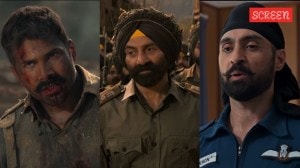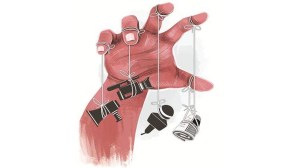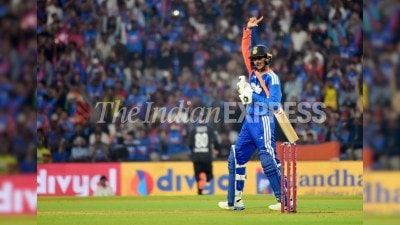Stay updated with the latest - Click here to follow us on Instagram
Bound by Rigour
A few weeks ago,Oscar-nominated documentary filmmaker Ashvin Kumars ambitious plans for his latest documentary,Inshallah Football,received a serious blow.
Documentary filmmaker Ashvin Kumars Inshallah Football comes up against a censorship block,pointing out the archaic system of evaluating films in India
A few weeks ago,Oscar-nominated documentary filmmaker Ashvin Kumars ambitious plans for his latest documentary,Inshallah Football,received a serious blow. On December 31st he received a letter from the Central Board of Film Certification outlining the reasons why his 120-minute documentary was granted an A certificate: The film has characters talking about mental and physical torture.. which can be damaging for a non-adult audience. This is a masking of the truth. The film only attempts to clarify the conflict in Kashmir, rants Kumar,who in the past has made films like Road to Ladakh (2003) and Little Terrorist (2004),which was nominated for an Oscar in the Live Action Short Film Category in 2005.
In a country where documentaries are quite a neglected genre,an A certificate attracts attention. In his 120-minute documentary,Kumar turns the camera on a shy and prodigious Basharat Baba,a 20-year old football enthusiast,who has been selected to represent a Brazilian football club. Since his father is a former militant,his dreams hit a roadblock as the State Government blocks his visa. The film pans out in the form of interviews of the protagonist,his fathers account of torture at the hands of security forces,and the blanket of security veiling the Valley. With an A certificate,Kumars options are strictly curtailed. He can no longer easily release his film theatrically; screenings in universities and schools are limited,and deals with satellite TV channels are almost off.
Documentary filmmaker Anand Patwardhan is all too familiar with the censor boards decisions. An A certificate makes little difference,but in case of a theatrical release,it would matter somewhat. The one place where it does have an impact is on TV. Here one will have to fight and argue for a slot, says Patwardhan,whose 1995 National Award wining documentary Father,Son and Holy War was ordered to be telecast on Doordarshan by the Supreme Court despite its A certificate. Even documentary maker Rakesh Sharmas 2002 documentary Final Solution,on the Gujarat riots,was awarded an A certificate.
On their part,the Indian Censor Board claims that they have a fair evaluating system. Every film received by the board is viewed by four panelists (Examining Committee) and a decision is passed. In case of objections,it is sent to a Review Committee (RC),generally comprising 7-8 members,which make its decisions known to the Chairman. In this case,the film went through three RCs,and was only cleared after an RC constituted by the Chairman,Sharmila Tagore,passed it. There were certain doubts raised by panel members on the portrayal of paramilitary forces. They have been shown in a negative light and their version of the story has not been taken into account, argues Mathur.
What strikes as ironic is that in November last year,the I and B Ministry granted a No Objection Certificate to Kumar for a private screening at the India Habitat Centre,to which the censor board also consented. We gave a clearance for that purpose. But that does not mean the film is suitable for general screening, clarifies Pankaja Mathur,CEO,Central Board of Film Certification.
The Indian censor boards criteria for decision making are broadly based on the Cinematograph Act,1952,which defines what content desensitises or dehumanises the people and can be psychologically damaging. But even by the Censor Boards admission,there is no clear cut definition of what constitutes for an A certificate. Anything with sex or vulgarity runs chances of being given an A, says Mathur.
A documentary by its very nature is meant to be risky and less dramatic than feature films. But for the Censor Board,these two mediums are one. Admitting this crucial flaw,Mathur explains,We request our panelists to be open minded while viewing documentaries. But we want to formulate a scheme where we can distinguish guidelines for features and documentaries.
Patwardhans 2002 feature film,War and Peace (2002) which won the National Award,was initially asked for 21 cuts by the second RC of the censor board. It was eventually given a U certificate,after intervention by the High Court. Director Rahul Dholakia who made films like Parzania (2005) and Lamhaa (2010) is also familiar with the boards scissors. Both his films were awarded A certificates,but he did not protest. I was already sappy by the end of the process so I did want to appeal to a Tribunal, he quips. There should not be a system of cuts. It should just be on the basis of grades, he continues.
For now,Kumar will have to settle for a unique marketing policy for his film or appeal to a tribunal.







